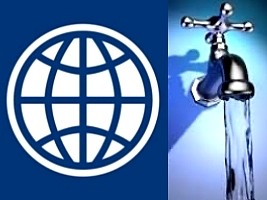|
||||||||||||||||||
| Download the revised decree and electoral calendar, published in the official journal |
|
|
Haiti - World Bank : $80M Grant to improve access to drinking water and sanitation in rural areas 19/05/2023 09:05:56
The World Bank's Board of Executive Directors approved Wednesday 17, a US$80 million grant for the Decentralized Sustainable and Resilient Rural Water and Sanitation Project in Haiti. This financing aims to increase access to inclusive, resilient, and sustainable potable water services to 250,000 people and access to basic sanitation services for 125,000 people, including 50% of women from small towns and rural communities across the country. “Access to clean water and sanitation are essential aspects of attaining the Sustainable Development Goals (SDG), as they drive economic growth, support healthy communities, and are essential and fundamental for life itself. In Haiti, recent improvements in access to quality water and sanitation have stalled and, in some areas, deteriorated because of, among other things, prolonged instability, increasing violence and insufficient investment in the sector,” said Laurent Msellati, World Bank Country Manager for Haiti. “This funding aims to support Haiti in achieving universal and equitable access to safe drinking water for all and adequate and equitable sanitation and hygiene for all, particularly in poor and remote areas.” In Haiti, rural areas and small towns’ access to basic drinking water is low and declining. In 2020, only 43 percent of the rural population in Haiti had access to at least basic drinking water, compared to 48 percent in 2015 and 50 percent in 1990. This situation is generated by a lack of investment in and maintenance of related infrastructure. Of the 13,626 improved water source facilities recorded in 2022, only 51% were working and, out of the 1,041 piped water supply systems serving dense rural areas and small towns, only 41% were functional. In 2020, 31% of the rural population still practiced open defecation, which could affect access to safe drinking water. The Decentralized Sustainable and Resilient Rural Water and Sanitation Project in Haiti aims to provide immediate cholera response measures, strengthen of sanitation and hygiene in cholera-affected communes and empower local authorities and communities to plan and execute water and sanitation projects. The project will finance the construction, rehabilitation and expansion of drinking water supply and sanitation systems in targeted areas and institutional strengthening activities including the consolidation of the programmatic sector-wide results-based approach to improve sector planning, budgeting, reporting and accountability. The project will contribute to the twin goals of the World Bank Group (WBG) of ending extreme poverty and promoting shared prosperity, by increasing access to basic drinking water and sanitation services for the populations living in rural areas and small towns. The project is aligned with the WBG’s Green, Resilient, and Inclusive Development (GRID) approach that emphasizes the cross-sectoral nature of development policies, focusing on the interrelationships of poverty, inequality, and environmental externalities.
|
|
|
Why HaitiLibre ? |
Contact us |
Français
Copyright © 2010 - 2026 Haitilibre.com |





